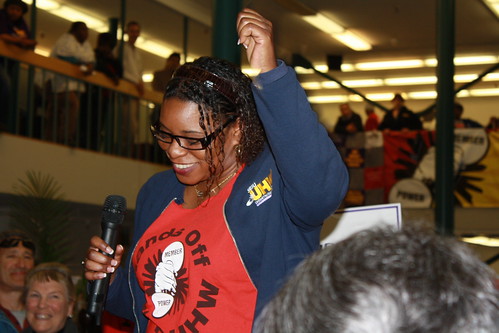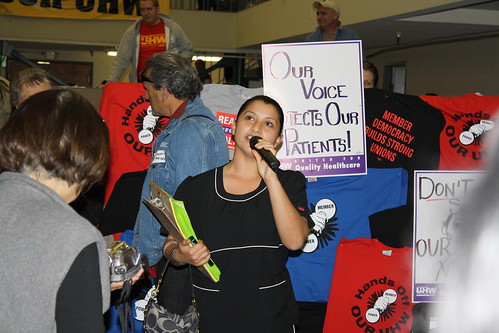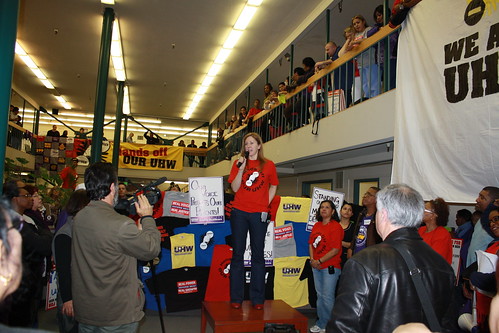In my previous posts, United Healthcare Workers Holding our Ground and We are the Union. SEIU who are you? I shared my experience of the trusteeship SEIU International imposed on SEIU-UHW and the birth of our new union, NUHW. What I’d like to do today is share with you why this experience has been a defining moment for me and my sisters and brothers building NUHW…
Reaching out
Since I joined SEIU-UHW I’ve gone through a kind of consciousness raising, to borrow a term from the 1960’s. I used to simply be concerned with my own benefits, my wages, my office space. I wasn’t selfish, just short sighted. I could only see what was in my world: my smallish world.
I’m a Medical Social Worker which means that I help patients with their psychosocial needs in the hospital. When my former local joined SEIU-UHW, I volunteered to take part in a two-week UHW campaign organizing other professionals at HCA hospitals in San Jose. Through that experience, I learned that my problems were really small compared to workers with no representation. I was exposed to the struggles of homecare workers, and long-term care workers and learned how very fortunate I was as a Kaiser UHW member.
In joining SEIU-UHW and reaching out to organize my fellow healthcare workers, I had joined the larger world of healthcare workers, organized and unorganized, and I realized my problems and my efforts were on a continuum with other workers. We had the same desires for fair wages, good working conditions, and most importantly, a voice in our workplaces. I experienced the power of joining with my sisters and brothers in collective struggles: I saw how much further I got in my own workplace when we stood with the workers in the larger bargaining unit in collective actions. With this larger worldview, I saw what we could accomplish together.
I learned that unions were by definition workers bonded together for a common cause: endorsing a vision of collective struggle for collective gain. As I got involved in political campaigns, in Iowa and New Mexico working to elect our new president, I was part of SEIU-UHW’s efforts to make change in one-to-one conversations, at the workplace, at the doors, and in Sacramento, in Washington, D.C.
One of the reasons SEIU-UHW was so successful was that we knew we couldn’t just be about fighting bad bosses, we had to be working to build the union at every level: to define ourselves beyond what we were fighting against, to define what we were fighting for, what we stood for.
A new union
I hate speaking and writing about SEIU-UHW in the past tense. But though it is no longer, our vision prevails in our work building NUHW. We still embody that vision and we are creating the new union. That new union lives in the present and the future, but to fully create our new union, we each have to stand up for what matters most right now. That means asking ourselves: what’s worth preserving beyond a paycheck, beyond benefits?
I believe union democracy is worth standing for because I have seen the power of these values embodied in UHW: putting workers first, empowering us to stand up for ourselves in our workplaces, and to stand for issues that affect patient care in Sacramento, to stand for electing a Democratic president, for the Employee Free Choice Act.
I believe in union democracy because I was and am part of it. Union democracy is a living, breathing organism. In the former UHW, union democracy wasn’t just an ideal it was a driving principle. I’m not suggesting SEIU-UHW was perfect, it was made of people and we’re never perfect. But its leaders had 20/20 vision in terms of seeing what mattered most, and ensuring that our actions were consistent with those values.
I had an epiphany in line at the first trusteeship hearing in San Mateo, while waiting behind my sisters and brothers to say my 2 minute’s worth to Ray Marshall, to SEIU’s attorneys. I was nervous, furious, so much was in my heart and so much was at stake. My legs shook, and I felt sick. Then it came to me. I didn’t have to say everything. It wasn’t about me, not me alone. I would be preceded by my sisters and brothers and succeeded by my sisters and brothers. Some of them were ranting and cursing, some of them were crying at the mic. Mine would be one of the voices speaking in support of my union and all that it meant. All I had to be was a drop of water in this great river headed to the delta. I could do that, and I could do it really well, I decided. I could be a fine droplet. And that would be plenty. Because the river was so much bigger and more powerful than I could ever be alone.
-Homecare workers’ rally, Fresno, California, March 2009
A defining moment
I keep hearing the phrase “defining moment” to describe this period of time in the labor movement, and it’s a true description. What impresses me every day is witnessing this moment defining us as people. As a social worker, I’ve seen these moments come to families when their sister/brother, mother/father is dying, I see families laugh their loudest, scream and rant and act out, attack others or wail and lay hopeless. I also experience people at their absolute kindest and most loving, their most vunerable and their strongest.
Moments like this where our gains are all in question, when all that we have worked to create is being threatened, our relationships with bosses, our pensions, even our trust in one another, bring out the best and the worst in us. Our stewards are being “fired” for refusing to let go of their allegiance to their sisters and their brothers, allegiance to their own beliefs. These moments have defining questions wrapped up into them: What we are willing to commit ourselves to? What are we willing to risk? What in us is unwavering? What won’t we give up? Where will we put our resources? Yes our money, but also our time and our energy. These moments show us who we are.
When I have doubt, or feel afraid, or am not sure that we’ll succeed, I look to my sisters and brothers, and I know who I am. I’m one of the big wide body of healthcare workers, the collective, and together, we are our most powerful, and our very best.
–Amy Thigpen, Medical Social Worker, Kaiser Fremont
::
Here’s how you can help:
JOIN our mailing list (by going to the sidebar and signing up for updates). TELL your elected California representatives that you support California healthcare workers’ freedom of choice to form NUHW through fast, free and fair elections, without harassment and intimidation from their employers or from SEIU. (Enter your zip in box and hit enter.) VISIT our website and DONATE to support our movement. And, most importantly, if you have friends or family who are healthcare workers and would like to join our movement to build a vibrant, member-led National Union of Healthcare Workers, please SPREAD THE WORD.



